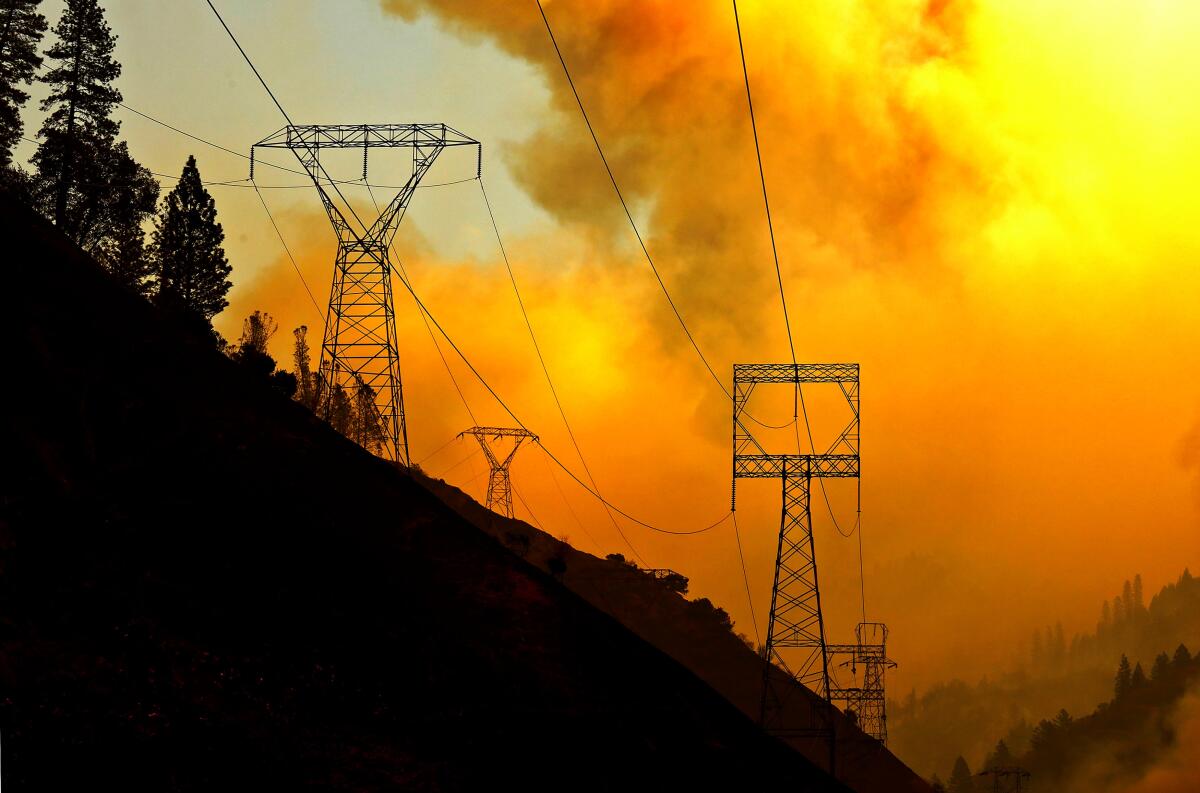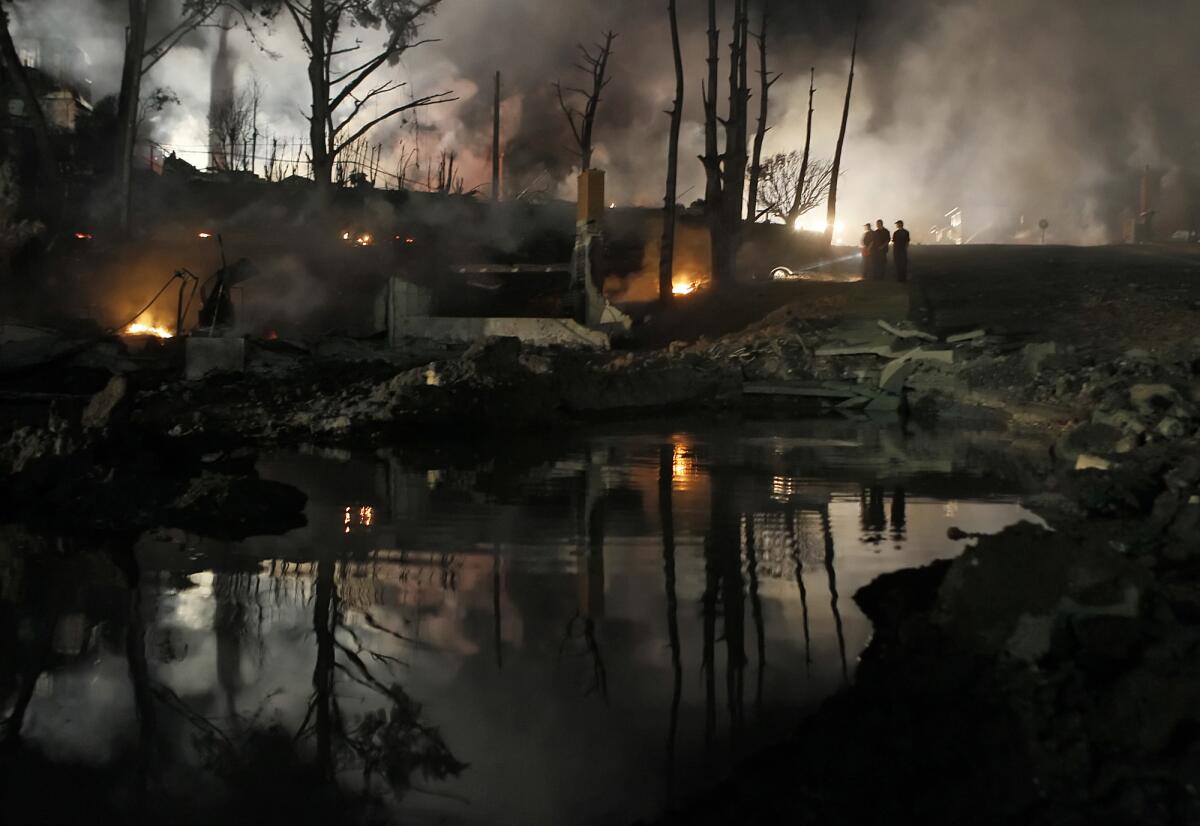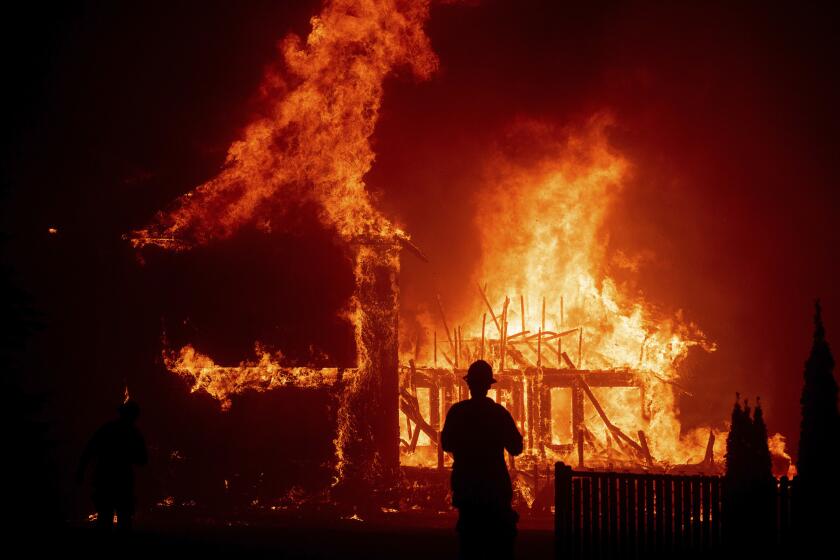How the Public Utilities Commission circumvents the California Public Records Act

- Share via
SAN FRANCISCO — The California Public Utilities Commission — which regulates day-to-day services as varied as electric utilities and ride-hailing companies — has long vowed to become more transparent in response to criticism it operates far too secretively.
Yet despite those promises, the CPUC has erected multiple roadblocks to prevent the public from learning about its handling of deadly disasters and corporate scandals, according to a San Francisco Public Press review of court records and interviews with 1st Amendment attorneys.
Applying century-old laws meant to fight railroad corruption, the commission has effectively limited court enforcement of the state’s public records act. But a forthcoming ruling in a lawsuit challenging that long-standing practice could bring more transparency to the powerful commission.
The lawsuit disputes the agency’s refusal to release records concerning its communications with Gov. Gavin Newsom’s office about the 2018 Camp fire — the state’s deadliest wildfire — and the agency’s decision to waive a $200-million penalty against PG&E.
The case was brought by television station ABC10 in Sacramento and its reporter Brandon Rittiman, whose coverage of the fire has garnered national attention. It claims the agency must comply with the California Public Records Act, which says all agencies must release public records “promptly.”
The commission contends the lawsuit should be dismissed because Rittiman’s request — already more than a year old — did not comply with a lengthy administrative process intended to limit abusive litigation by railroad barons fighting regulatory decisions.
But at a hearing earlier this month before the 1st District Court of Appeal in San Francisco, two of the three justices seemed skeptical about the commission’s claim that the old law applies to the more recent records act.
“I find it sort of striking, if not extreme,” Presiding Justice Jim Humes said to the agency’s lawyer, adding later, “You like the Legislature’s actions a century ago, but you don’t really like the Legislature’s actions more recently?”
David Snyder, executive director of the First Amendment Coalition, a nonpartisan organization dedicated to advancing government transparency, which is supporting the lawsuit, said it’s “absolutely crucial” that people have timely court review of agency denials of their requests for information.
“Administrative agencies should not and cannot have the final say on whether the Public Records Act has been followed,” said Snyder, a lawyer and former journalist. “That’s the proverbial fox guarding the henhouse.”
Citing special powers granted no other state agency, the commission has denied requests for records on its handling of catastrophes such as Pacific Gas & Electric Co.’s Camp fire, the failed San Onofre nuclear power plant and thousands of collisions and assaults on Uber and Lyft rides, a review of court cases and state documents found.
Those powers were intended to fight the corrupting influence of the railroads, but the commission has deployed them to undercut the records act, meant to promote government transparency and accountability, court records show.
The agency has denied its procedures violate the act’s requirements that it release records promptly. In adopting its current policy in 2018, it called such allegations “simply speculative” and cited “our longstanding practices supporting disclosure and our progressive development of rules that will promote public access to records in our possession.”
The Camp fire court case highlights hurdles facing anyone seeking records from the agency, which regulates power, water, telephone, transportation and other utilities. It is responsible for ensuring utility services are fair and safe.
According to Steve Zansberg, the Denver-based attorney for ABC10, the case poses a fundamental question: Is the commission above the state law that requires all agencies to promptly release records about how they conduct public business?
“We’re trying to hold the PUC accountable,” he said in an interview. “You can’t do that if you don’t have access to the records that show what’s going on behind the scenes.”
Christofer Nolan, a lawyer representing the agency, did not respond to emails seeking comment. Terrie Prosper, the commission’s director of news and outreach, also declined to comment.
“We’re trying to hold the PUC accountable. You can’t do that if you don’t have access to the records that show what’s going on behind the scenes.”
— Steve Zansberg, lawyer for ABC-10 in its lawsuit against the CPUC
Besides the San Rafael-based First Amendment Coalition, the lawsuit has won support from the Associated Press and the Emeryville-based Center for Investigative Reporting, the nation’s oldest nonprofit investigative newsroom.
Matthew Cate, the Washington, D.C., attorney who filed a brief on behalf of the organizations, wrote that the commission has a history of “unlawful delays” in responding to requests and that its practices could encourage other agencies to erect similar obstacles to public information.
“The PUC has created a set of procedures completely contrary to the letter and spirit of the CPRA and the constitutional right of access to public records,” Cate wrote, referring to the state public records act.
A review of court cases, commission filings, legislative history and interviews with attorneys, in addition to this reporter’s experience as a requester, found a gantlet of obstacles:
- The agency can take months or years to release records. Between Jan. 1, 2017, and April 4, 2022, the agency received 3,115 requests and took an average of 58 days to close them, statistics it released under the public records act show. Five requests submitted by the Public Press for records concerning thousands of ride-hailing safety incidents have taken between six and 27 months.
- The commission tends to interpret the scope of requested records narrowly, while applying exemptions from disclosure broadly, effectively reducing public access to information.
- With other state agencies, a person may directly seek independent court review of a denied request. But under commission rules, they must first file an administrative appeal and then apply for a rehearing, a far more cumbersome and lengthy process.
- The commission requires requesters to appeal within 10 days or lose their right to challenge its denial, compared with 90 days allowed under the federal Freedom of Information Act.
- Agency rules provide no deadline for the commission to resolve appeals or rehearings, and the agency asserts that requesters may not seek court review until it has, effectively holding their requests in limbo. Federal law, by contrast, lets requesters sue as early as 20 working days after appealing.
- With all other California agencies, requesters may seek review in a local Superior Court. But for the commission they may seek review only in state appeals courts or the California Supreme Court, forums that are more complicated and costly, effectively deterring independent review of denials.
The commission has said it is dedicated to transparency but must balance that goal with its duty to maintain confidentiality of trade secrets and personal data in company filings.
It has noted that no other agency in the state is required to follow both the records act and the Public Utilities Code, which says any employee who releases confidential information submitted by a utility, unless ordered to by the commission, is subject to a misdemeanor charge. This legal requirement “is unique to the Commission and thus analogy to other state agencies or local governments’ processes,” it said, are “inapplicable.”
The agency says it adopted its system of administrative appeal and rehearing to let requesters show information should be released, and utilities show it is truly confidential, before the commissioners make a final decision.
But attorneys for requesters noted that employees of other agencies also face criminal penalties for improperly releasing information, such as rap sheets or medical records.
And whatever internal process an agency creates, they say, it may not violate the records act’s clear deadlines.
Enacted in 1968, the California Public Records Act is modeled on the federal Freedom of Information Act. The state law declares that “access to information concerning the conduct of the people’s business is a fundamental and necessary right.”
It says all state agencies “shall” determine whether the requested records are releasable within 24 days, immediately notify the requester and “promptly” release them. If an agency withholds records, it says, requesters may seek court review “at the earliest possible time.”
Voters bolstered the law in 2004 when they overwhelmingly passed Proposition 59, which embedded these words in the state Constitution: “The people have the right of access to information concerning the conduct of the people’s business, and, therefore, the meetings of public bodies and the writings of public officials and agencies shall be open to public scrutiny.”
Like the records act, the commission has roots in a voter-backed constitutional amendment. The agency was created as the Railroad Commission in 1879 but was corrupted by the Southern Pacific Railroad, which dominated state politics, says a history written by commission staff.
In 1911, voters propelled by Gov. Hiram Johnson’s reform platform granted the agency greater autonomy with the intent of preventing corruption. Its authority was extended to other utilities and in 1946 it received its current name. It is led by five commissioners appointed by the governor for six-year terms. They oversee 1,402 employees and a $1.1-billion budget.
Three court cases spotlight how the agency has sought to block public access.
The 2010 explosion of a PG&E gas pipeline in San Bruno killed eight residents and injured dozens more. San Bruno officials suspected PG&E and agency staff were secretly negotiating an unfairly light penalty against the utility for causing the blast.

To find out, the city requested copies of communications with PG&E executives, but the agency largely failed to respond, San Bruno City Atty. Marc Zafferano recalled.
The city filed an administrative appeal — only to discover commission rules specified no deadline for its decision. Eventually, the city sued and reached a settlement in which the agency released records, spurring PG&E to release many more.
The records confirmed there were improper private communications between the agency and utility, for which PG&E agreed to pay $97.5 million in penalties. It also was fined $1.6 billion for violating safety standards.
Under the settlement, the commission reviewed its public records procedures. San Bruno urged it to adopt deadlines to end the “potentially endless appeals process that it completely controls.”
But in a 2018 order the agency dismissed such concerns as speculative and adopted its current policy, General Order 66-D.
Michael Aguirre, a former federal prosecutor in San Diego, hit similar barriers when he sought records on the 2012 shutdown of the San Onofre nuclear power plant, where engineers had discovered a radioactive leak.
Aguirre represented utility customers challenging the commission’s decision that they pay $3.3 billion of the $4.7-billion cost of the failed reactor. In 2016, he requested copies of communications between the commission and Gov. Jerry Brown’s office about San Onofre. The agency claimed they were confidential.
Aguirre sued in state appeals court, contending the governor’s office might have secretly influenced the agency’s decision on costs, and the public had a right to know. The agency, he said, “engaged in extreme delay tactics.”
The commission denied Aguirre’s claims and asked the court to dismiss his lawsuit because he had not applied for a rehearing at the agency until after he sued. Since that application was pending, it said, the court had no jurisdiction.
The court did not address that issue but in June 2018 ordered the agency to release more records.
In a separate federal lawsuit, Aguirre and his law partner, Maria Severson, won commission approval later that year of a revised decision saving ratepayers $775 million on the plant closure.
In recent years, the commission has made more information public. It no longer lets companies simply stamp their filings “confidential,” requiring specific justifications for secrecy claims.
But as ABC10’s Rittiman found, the agency still poses obstacles to records requests.
The Camp fire in Butte County burned 153,336 acres, destroyed 18,000 structures and killed at least 85 people. PG&E pleaded guilty to 84 counts of involuntary manslaughter and one of causing the fire.
Rittiman wanted to know why the agency waived a $200-million fine against PG&E, and whether the governor’s office influenced that decision.
California fire: What started as a tiny brush fire became the state’s deadliest wildfire. Here’s how
Before there was a spark, there was the wind.
On Nov. 19, 2020, he requested communications between then-commission President Marybel Batjer and Newsom’s office. The agency said the records were confidential.
Rittiman filed an administrative appeal, which the agency denied a year later. He applied for a rehearing, which the agency denied as improperly filed.
On June 14, 2021, Rittiman sued. The agency tried repeatedly to get the case dismissed. But on May 3 the appeals court finally heard arguments on whether the commission must meet the deadlines in the records act.
Nolan, the agency’s lawyer, conceded Rittiman’s request was taking “longer than we would like.” However, Nolan said that under the Public Utilities Commission’s century-old rules he could not seek court review.
But Associate Justice Kathleen M. Banke asked why the court couldn’t conclude that, in later passing the records act, the Legislature “crafted a different kind of scheme, and it seems pretty clear that it applies directly to the PUC.”
A decision in the case is expected by Aug. 1.
Rosenfeld writes for the San Francisco Public Press, an independent nonprofit newsroom that produces investigative and solutions journalism. For more of its coverage on this topic, see Ride Hailing’s Dark Data.
This story was produced in partnership with the McGraw Center for Business Journalism at the Craig Newmark Graduate School of Journalism at the City University of New York. Support also came from the Fund for Investigative Journalism.
More to Read
Sign up for Essential California
The most important California stories and recommendations in your inbox every morning.
You may occasionally receive promotional content from the Los Angeles Times.











